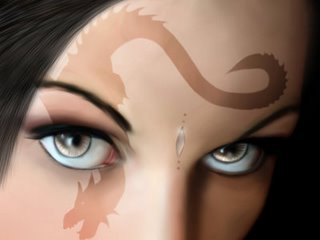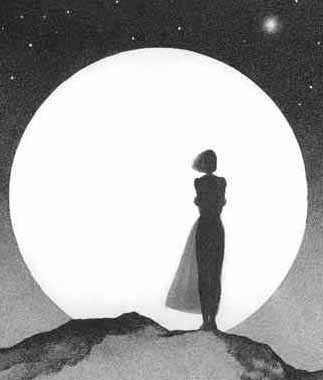 Somehow I've managed to not talk about one of my other fascinations. That is shocking to me, since it's possibly an even bigger obsession than Star Wars and blogging together. I know, it's that bad.
Somehow I've managed to not talk about one of my other fascinations. That is shocking to me, since it's possibly an even bigger obsession than Star Wars and blogging together. I know, it's that bad.I've always been a fan of fantasy and the line between reality and makebelieve is one I find very interesting indeed. And as macabre as it may sound, the role death plays in that.
Sounds creepy? I bet. But I've always been fascinated by so-called "gothic novels" and the gothic subculture.
And vampires.
Vampires and the goth lifestyle are often associated, for obvious reasons. Goth wear black clothes, often oldfashioned style, dye their hair black and pale their faces. The resemblance to an undead corpse isn't that farfetched.
However, both vampires and goths are often misinterpreted. When talking about vampires, people quickly start to talk about stakes, garlic and full moons. Full moons? That's werewolves for you. Their ancient enemy. But vampires are fascinating. I once did an essay on them, and discovered that although cultures around the world have their own sort of vampires - just like dragons - they are all just a bit different.
So what defines a vampire?

Is it being a walking corpse? Nah, some cultures believe in vampires that have nonhuman origins, or no origin in life at all. Is it the human appearance? Nah, some believe in vampires made of flames. Is it the seducing aspect? Nah, some vampires are just plain gross. Kind of like zombies.
Is it the blooddrinking? There are some creatures that do not drink blood, yet they are most definately vampires.
So what defines a vampire?
And what defines a goth?
Goth, in my opinion, is misinterpreted by many people, even goths. Does that sound ridiculous? I'm sure. But please realize just how many people just try to fit in, even in such small and remarkable groups. However, misunderstanding is more common amongst those who are not gothics.
I once had a conversation with a religious woman who had read about goths, yet she never had encountered any. She was appalled, yet fascinated. Of course the article, in a christian magazine, was not too objective, and often reminded readers that some goths deny god, or are satanists. And I explained, that the essence of goth is not that.
Goth, in essence, is a philosophical view of life, in which death is acknowledged as the ultimate certainty. Every being is subject to death, human and animal alike, and also angels, demons and gods. Goths are not religious by that view, since they do not see any god or devil as mightier than death. Satanists are not gothics.
However, the misunderstanding stems from that view o
 f death. Many people think gothics are fascinated by death, yet the opposite is true. In accepting the finality of death, gothics take more pleasure in life.
f death. Many people think gothics are fascinated by death, yet the opposite is true. In accepting the finality of death, gothics take more pleasure in life.Gothics enjoy life on a more conscious level than most of us.
I know there are people that call themselves goths and disagree with this. But in essence, this is what gothic is all about. Misunderstanding comes from too few explanations from the gothic subculture, but also because people don't bother to look under the eerie surface.
I would call myself gothic if it wasn't for the fact that I don't wear makeup. I do like dark medieval-looking clothes, and I love the silvery jewelry with pentacles and such. I am not fascinated by death, yet I am fascinated by vampires. The nightstalking undead, caught between their previous lives and the death they cannot reach. The ultimate exception to the ultimate truth.
Please don't look down on goths ever again.
